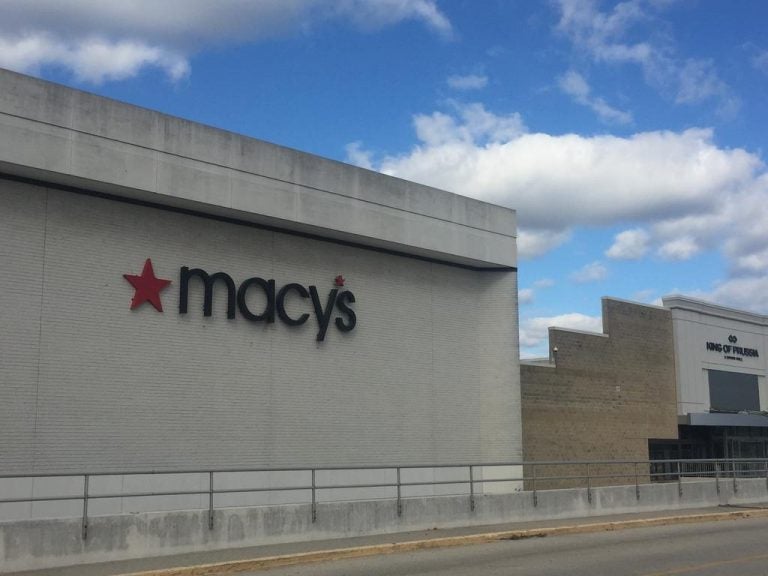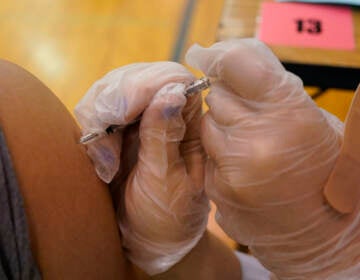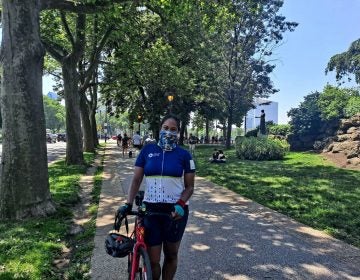King of Prussia Mall will eventually reopen, but the shopping mecca may never be the same
Bankruptcies for retailers such as J. Crew will take a toll on King of Prussia Mall when it eventually reopens.

Macy's at the King of Prussia Mall. (Natalie Kostelni/Philadelphia Business Journal)
This article originally appeared on the Philadelphia Business Journal.
___
When the King of Prussia Mall eventually reopens, there will be a series of safety protocols that its employees will be required to follow while its retailers and shoppers will be encouraged to voluntarily adhere to similar measures to help keep the coronavirus from spreading.
No date has yet been set by owner Simon Property Group (NYSE: SPG) to reopen the King of Prussia Mall and its other Philadelphia-area retail properties, including Philadelphia Mills and the Philadelphia Premium Outlets. When shoppers do return to King of Prussia, they will be arriving at a mall that will be on the cusp of a transition as a result of the pandemic and its effect on the retail industry, as well as forces already impacting it.
“This will accelerate a bunch of trends that we have been talking about when it comes to retail,” said Shawn Howton, a professor of finance and real estate at Villanova University and director of its Daniel M. DiLella Center for Real Estate.
From an increase in online shopping to the survival of restaurants, all types of retailers are being tested at this time, Howton said. Some questions that will arise from the changes underway include whether restaurants need to provide more space for social distancing and if a landlord will adjust rents downward to reflect that. When some retailers go dark, how will malls and property owners backfill the space since demand for traditional retail is expected to remain sluggish?
“This will provide an opportunity for property owners to rethink uses, and there will be capital on the sidelines to take advantage of this,” Howton said.
The biggest difference between the Great Recession and the Covid-19 crisis is that the pandemic isn’t just an economic issue but also a health issue, which brings a whole series of challenges. “Even when a municipality says you’re good to open, what does that even look like?” said David Putro, senior vice president at investment research firm Morningstar.
When some states allowed malls to open this weekend, only about 20% of their stores reopened and most of the shoppers who ventured to those malls were ordering online and picking up items in the store, Putro said. That raises other questions for retailers, such as what staffing levels should be.
“It’s layer after layer,” he said. “It’s a really interesting time.”
At this point, it’s too soon to predict how consumer behavior will change, he said. Will people feel comfortable trying on clothes after someone else has tried them on? With high unemployment, will consumers feel like spending on a new pair of jeans or will they be more thrifty?
J. Crew’s parent company, Chino Holdings, filed for Chapter 11 bankruptcy Monday, and other stores that are marquee tenants at King of Prussia are expected to seek similar financial protections as they struggle. Some of those retailers with unknown fates include large department stores that have been mainstays at the mall for decades and take up large anchor spaces at the property.
Neiman Marcus is one of those with a precarious future and is reportedly nearing a bankruptcy filing. Others that are in flux include Nordstrom, Lord & Taylor, Sears, Macy’s and Bloomingdales. The latter four are already retrenching and closing stores.
Smaller retailers such as J. Crew, which also has the Madewell brand, aren’t the only ones on the brink, according to various published and analyst reports. Gap Inc., which also has Banana Republic, Athleta, Old Navy and other brands, said in a Securities and Exchange Commission filing that it has drawn down most of a $500 million line of credit, doesn’t intend to pay rent until its stores reopen, and has taken other cost-cutting measures.
Urban Outfitters Inc. is among many other retailers that have furloughed employees and stopped paying rent while stores are closed.
Efforts to reach Simon Property Group representatives for comment were unsuccessful.
The King of Prussia Mall, the largest in the nation by retail square footage, is a destination for tourists, conventioneers and locals. The mall’s success has been in providing stores with merchandise in a variety of price ranges. A shopper can get a $10 T-shirt at Primark or $700 Gucci sneakers at Neiman Marcus.
Simon has in recent years begun to reposition the mall with a mix of uses, and preliminary plans involve adding a hotel, apartments, offices and other property types. The company is working through those plans with Upper Merion planning officials. Deep-pocketed mall owners such as Simon have done well and been creative when re-tenanting, Putro said.
The company is starting to reopen its malls in states where they have been given the green light. The company’s Grove City Premium Outlets in Mercer County, Pennsylvania, are scheduled to open May 8, according to a schedule of properties Simon has issued for future reopenings.
Grove City is in one of 24 counties Gov. Tom Wolf announced will reopen beginning this Friday. Though that is the case, the Pennsylvania Department of Community and Economic Development said the state still considers malls as “non-life-sustaining.”
“However, pharmacy or other health care facilities within malls may continue retail operations,” said Casey Smith, spokeswoman for DCED. “For counties that are moving to the ‘yellow’ phase as announced [May 1], guidance for businesses is forthcoming.”
New health and safety protocols are increasingly becoming a part of any construction, work, grocery or other place of business reopening as the coronavirus remains a threat. The guidelines Simon has outlined are more self-regulating for shoppers rather than required.
At any Simon property, Simon employees, contractors and vendors of the real estate investment trust will be required to take their own temperatures prior to arriving at a property and advised to stay home if they exhibit symptoms of the coronavirus. The company did not divulge how it would enforce self-screening.
“Additionally, those exposed to COVID-19 will be required to quarantine at home until they are symptom free for at least 72 hours and satisfy other CDC requirements prior to returning to work,” Simon said.
While Simon employees will wear protective face masks and will practice social distancing, it will “recommend that tenants, contractors and vendors also implement these protocols,” the company said. It will also encourage shoppers to wear masks and social distance.
Directional signage to keep shoppers moving, limited seating in food areas and spacing in restrooms will be incorporate into the malls. In addition, the mall operator will provide, free of charge, masks and sanitizing wipes to shoppers requesting them, as well as free temperature testing.
Pennsylvania Real Estate Investment Trust (NYSE: PEI), which owns malls throughout the area including Fashion District Philadelphia and the Plymouth Meeting Mall, has not indicated when it will reopen its properties. Efforts to reach a representative from the company were unsuccessful.
WHYY is your source for fact-based, in-depth journalism and information. As a nonprofit organization, we rely on financial support from readers like you. Please give today.


![CoronavirusPandemic_1024x512[1]](https://whyy.org/wp-content/uploads/2020/03/CoronavirusPandemic_1024x5121-300x150.jpg)

